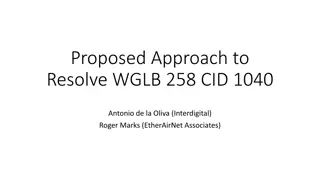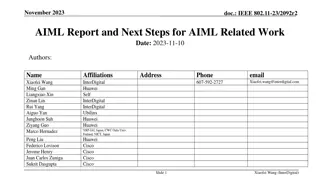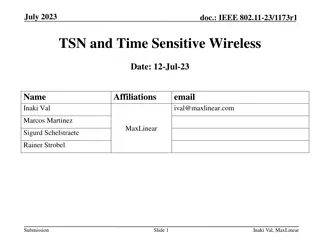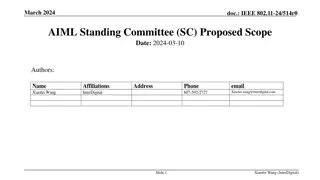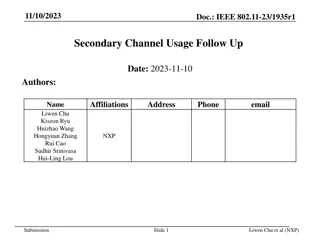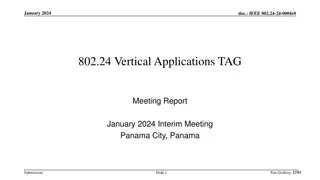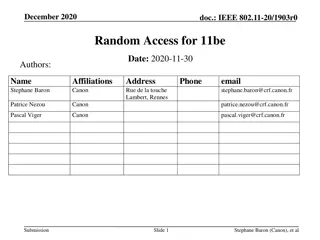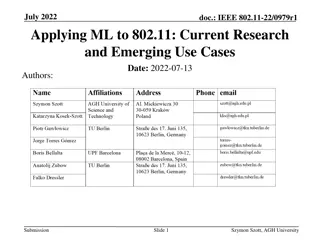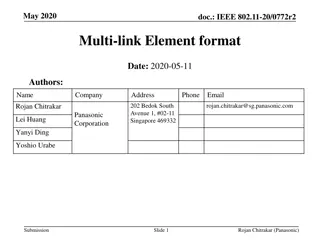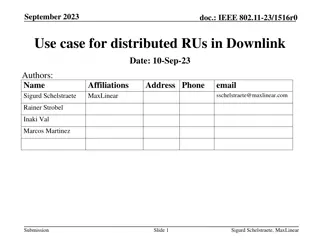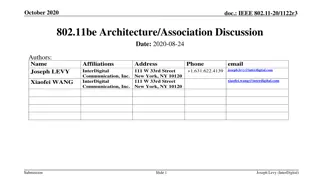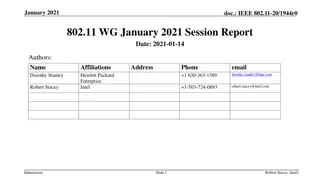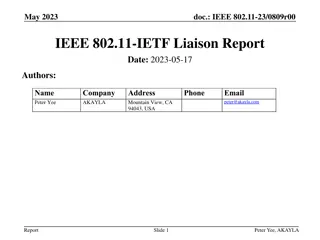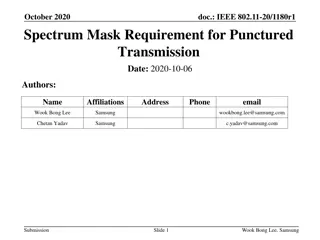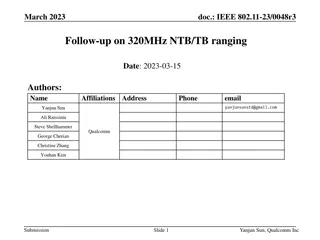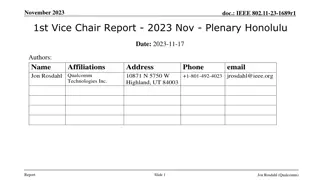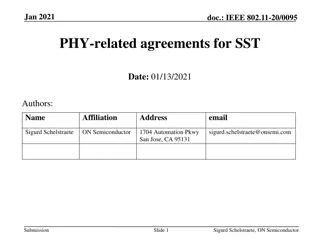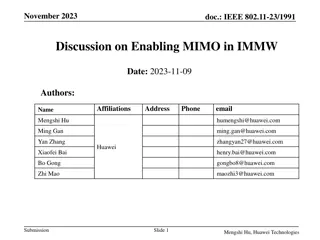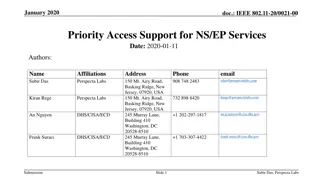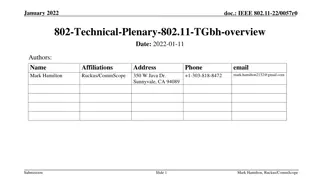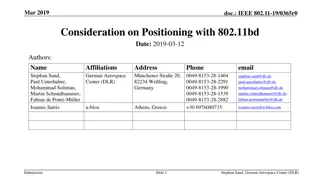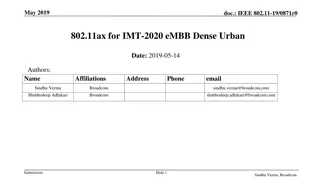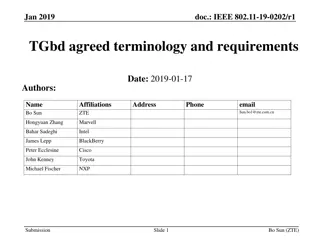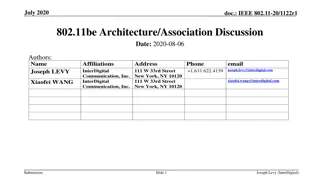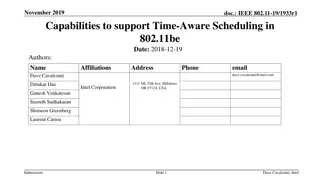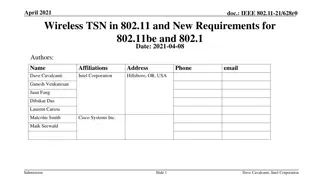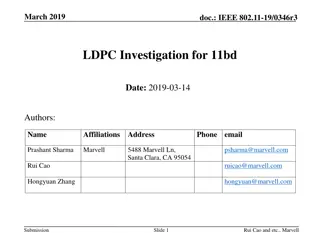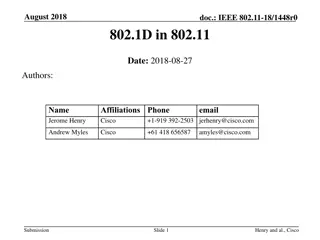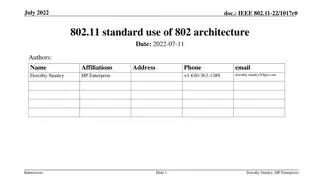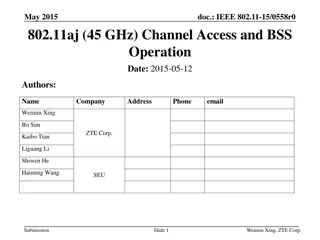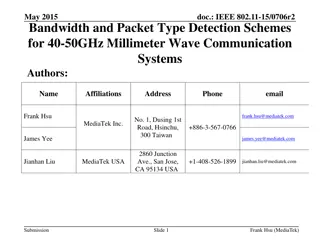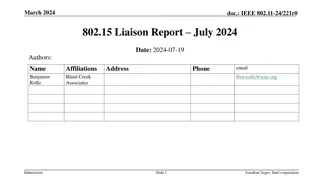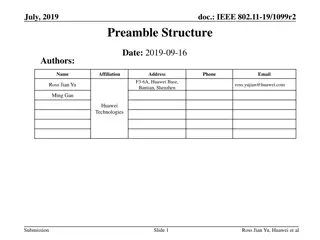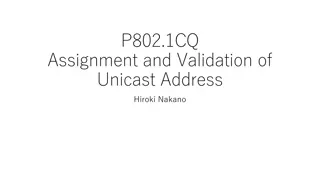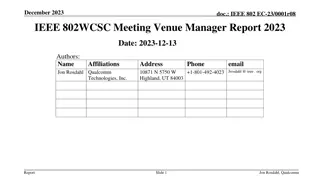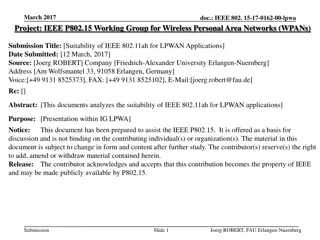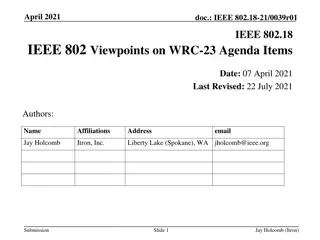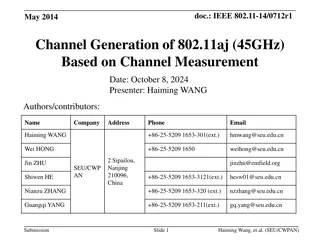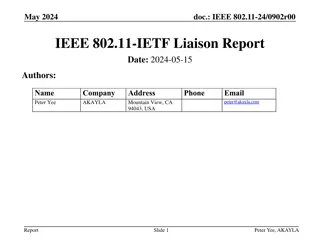Proposed Approach for MAC Address Assignment in IEEE 802.11
IEEE 802.1CQ is working on a mechanism to assign local MAC address blocks to end nodes specifically related to IEEE 802.11 standards. The current draft lacks a pre-association mechanism for IEEE 802.11 stations to obtain a local MAC address before association. The proposed remedy suggests specifying
6 views • 7 slides
IEEE 802.11-23/2092r2 AIML Report Summary
This document conveys the findings of the AIML Technical Report for IEEE 802.11 networks. It covers AIML use cases in WLANs, performance enhancement opportunities, IEEE 802.11 feature requirements, standard impacts, and proposed next steps for AIML integration. AIML's significance in various technol
3 views • 17 slides
TSN and Time Sensitive Wireless
This document explores the relationship between IEEE 802.11 and Time Sensitive Networking (TSN), defining TSN in the context of 802.11 and highlighting the importance of TSN for improving packet delivery, reducing latency, and enhancing network reliability. Various features like Multi-AP, preemption
6 views • 18 slides
IEEE 802.11-24/514r0 AIML Standing Committee Scope Proposal
This document proposes the scope and closing down criteria for the formation of an Artificial Intelligence/Machine Learning (AI/ML) Standing Committee within the IEEE 802.11 organization. The proposed activities include reviewing AI/ML use cases in 802.11 systems, exploring technical feasibility, an
0 views • 5 slides
Enhancing Secondary Channel Usage in IEEE 802.11 Standards
This document, IEEE 802.11-23/1935r1, delves into the intricacies of secondary channel usage within the context of IEEE 802.11 standards. Key topics covered include discussions on RU index, BW negotiation in secondary channels, methods to ensure medium synchronization when transitioning back to prim
0 views • 14 slides
IEEE 802.24 Vertical Applications Meeting Report January 2024
The January 2024 meeting report of IEEE 802.24 Vertical Applications TAG covers various topics including Smart Grid, IoT, low latency communication, IoT White Paper, AFV communications, and revisions to existing standards. Tim Godfrey from EPRI presented slides outlining the progress and submissions
0 views • 9 slides
Proposal for Random Access Efficiency Enhancement in IEEE 802.11be Networks
This document presents a proposal for enhancing random access efficiency in IEEE 802.11be networks through a Random-Access NFRP (RA-NFRP) principle. The proposal addresses the challenges of low efficiency in the current UORA procedure and introduces modifications based on the 802.11ax standard to im
5 views • 16 slides
Exploring Machine Learning Applications in Enhancing 802.11 Performance
This document delves into recent research on utilizing machine learning (ML) to enhance 802.11 performance, focusing on emerging use cases and the increased interest in ML applications in the field since 2019. It outlines the ML areas frequently used, such as supervised learning (SL) and reinforceme
1 views • 23 slides
IEEE 802.11-20/0772r2 Multi-Link Elements Overview
IEEE 802.11-20/0772r2 discusses various aspects of multi-link elements in the context of IEEE 802.11 standards. The document covers the need for efficient element ID extension, different multi-link element structures, including authentication algorithms, common controls, and sub-elements organizatio
1 views • 10 slides
Use Case for Distributed Resource Units in Downlink Scenarios
The document explores the concept of distributed Resource Units (dRU) in downlink scenarios in IEEE 802.11 standards like 802.11ax and 802.11be. It discusses the benefits and potential advantages of using dRU in downlink transmissions, focusing on how it can effectively distribute tones across the s
3 views • 13 slides
Discussion on IEEE 802.11be MLD Architecture Alignment
IEEE 802.11 TGbe is exploring MLDs within the 802 architecture, focusing on aligning MLD operations with existing 802.11 features for enhanced compatibility. The MLD architecture aims to facilitate the flow of data between MAC SAPs and PHY SAPs, extending the current framework for APs and non-AP STA
1 views • 23 slides
IEEE 802.11 Working Group Session Reports - January 2021
Digest of closing reports and liaison reports from all 802.11 sub-groups presented at the IEEE 802.11 Working Group's January 2021 closing plenary meeting. The documents include details on membership, attendance, attendees by affiliation, and subgroup attendance from November to January, as well as
2 views • 97 slides
May 2023 IEEE 802.11-IETF Liaison Report by Peter Yee
This document presents the IEEE 802.11-IETF liaison report for May 2023 by Peter Yee from AKAYLA. It includes details on upcoming IETF meetings, joint activities between IETF and IEEE, topics of coordination, and information on relevant protocols and BOFs to be discussed. Additionally, it outlines t
1 views • 18 slides
Spectrum Mask Requirements in IEEE 802.11 for Punctured Transmission
The document discusses the spectrum mask requirements for punctured transmission in IEEE 802.11 standards, specifically focusing on differences between ETSI and IEEE 802.11ax spectral masks. It covers cases of puncturing scenarios and additional channel edge masks to be applied in different situatio
1 views • 16 slides
IEEE 802.11 Proposal for 320MHz Ranging Enhancement
This document discusses the proposal for enhancing IEEE 802.11 with support for 320MHz bandwidth ranging operations. It aims to improve ranging accuracy by expanding 802.11az frames and procedures to accommodate the increased bandwidth. The focus is on MAC-related changes, exploring different option
1 views • 26 slides
IEEE 802.11-23-1689r1 Vice Chair Report - November 2023 Plenary Session
The document presents the Vice Chair report by Jon Rosdahl from Qualcomm at the IEEE 802.11-23-1689r1 meeting in Honolulu on November 17, 2023. It covers agenda items, session information, meeting logistics, successful meeting protocols, and important event summaries. Additionally, it provides detai
1 views • 25 slides
IEEE 802.11-20/0095 PHY-Related Agreements for SST
IEEE 802.11-20/0095 outlines agreements related to PHY aspects impacting the definition of Spatial Stream Tapping (SST) in 802.11 standards. The focus is on enabling 80 MHz operating stations to participate in 160 MHz OFDMA, including in non-primary 80 MHz scenarios. Various considerations and scena
1 views • 11 slides
Discussion on Enabling MIMO in IMMW: IEEE 802.11-23/1991
Enabling MIMO in mmWave technology is essential for improving throughput performance. While IEEE 802.11ad supports single-stream communications, 802.11ay introduces SU-MIMO, MU-MIMO, and hybrid beamforming. This document discusses the necessity of MIMO in IMMW and explores various MIMO options for e
2 views • 12 slides
IEEE 802.11-20/0021-00 Priority Access Support for NS/EP Services Overview
This document discusses the importance of priority access support in IEEE 802.11be for National Security and Emergency Preparedness (NS/EP) services. It outlines the need for standardized mechanisms to ensure priority services in WLAN networks during NS/EP events when cellular coverage is unavailabl
1 views • 15 slides
IEEE 802.11bh Overview: RCM and TGbh Activities
Overview of IEEE 802.11 Task Group bh (TGbh) activities related to Randomized and Changing MAC addresses (RCM) for user privacy protection. The document discusses the purpose of RCM in concealing device identities, potential impact on network recognition and user experience, and the evolution of IEE
0 views • 9 slides
Positioning Considerations in IEEE 802.11bd for Vehicular Communication
Discussing the implications of IEEE 802.11mc and 802.11az improvements on Fine Timing Measurement (FTM) protocol for positioning in high mobility environments, particularly focusing on V2X communications and vehicle speeds up to 250 km/h. The document addresses positioning modes, interoperability, c
0 views • 7 slides
802.11ax Evaluation for IMT-2020 eMBB in Dense Urban Environments
The document presents a detailed analysis of the 802.11ax technology's performance in meeting IMT-2020 requirements for eMBB in dense urban settings. It includes results from simulations evaluating peak spectral efficiency, data rates, user experience, and mobility metrics. The study confirms 802.11
0 views • 14 slides
IEEE 802.11-19-0202/r1 TGbd Agreed Terminology and Requirements
This document outlines the agreed terminology and requirements for the development of the next generation of IEEE 802.11p technology within IEEE 802.11bd Task Group. It covers aspects such as interoperability, co-existence, backward compatibility, and fairness between IEEE 802.11p and IEEE 802.11bd
0 views • 6 slides
IEEE 802.11be MLD Architecture Discussion
The document discusses the architecture of MLD (Multicast and Local Delivery) within the IEEE 802.11be framework. It highlights how MLD will align with existing 802.11 basic architecture, emphasizing the management of access to PHY and media for both AP and non-AP devices. The goal is to integrate M
0 views • 9 slides
Time-Aware Scheduling Capabilities in IEEE 802.11be
Describing necessary enhancements to enable Time-Aware Scheduling in IEEE 802.11be for time-sensitive applications. The focus is on aligning with the 802.1Qbv standard to address latency, jitter, and reliability issues, presenting a structured outline of requirements and configurations essential for
0 views • 24 slides
Wireless TSN in 802.11: New Requirements and Integration with 802.1
This document discusses the extension of TSN capabilities from wired to wireless networks, focusing on potential enhancements for 802.11be and integration with Ethernet-based TSN standards. It covers topics such as time-sensitive applications, TSN toolbox overview, status of TSN capabilities support
4 views • 12 slides
LDPC Investigation for IEEE 802.11bd Technology in March 2019
In March 2019, the document IEEE 802.11-19/0346r3 delves into the investigation of LDPC (Low-Density Parity-Check) codes for the advancement of 11bd technology. The authors from Marvell explore the potential benefits of LDPC over BCC (Block Code Concatenation) in achieving better sensitivity for 802
0 views • 15 slides
Evolution of Standards: IEEE 802.11 and 802.1D Relationship
Explore the relationship between IEEE 802.11 and 802.1D standards, discussing the necessity of referencing old standards, the state of 802.1D, and the potential for removing outdated references in 802.11. The submission proposes a migration model while emphasizing the importance of staying current w
0 views • 42 slides
IEEE Std. 802.11-22/1017r0 Overview and Architecture Presentation
This presentation by Dorothy Stanley from HP Enterprise delves into the utilization of IEEE Std. 802.11-2020 standards focusing on the IEEE Std. 802 overview and architecture. It covers topics such as the use of LLC, MAC address formats, QoS mechanisms, MSDU formats, and various MAC services and pro
0 views • 10 slides
Privacy Issues in IEEE 802.11 Networks: Tracking and MAC Randomization
This presentation delves into the privacy concerns surrounding 802.11 networks, focusing on tracking vulnerabilities and the limitations of MAC randomization in preventing tracking. It discusses the ease of tracking devices, the risk of passive tracking due to MAC addresses being visible in frames,
0 views • 27 slides
802.11aj 45 GHz Channel Access and BSS Operation Framework Proposal
This document outlines a proposal for channel operation and BSS operation in the 45 GHz frequency bands for 802.11aj in China. It includes details on channelization, spectrum allocation, maximum transmit power, and BSS configuration rules. The aim is to meet the functional requirements specified whi
0 views • 32 slides
Bandwidth and Packet Type Detection Schemes for 40-50GHz Millimeter Wave Communication Systems
The document discusses bandwidth and packet type detection schemes for 40-50GHz millimeter wave communication systems in IEEE 802.11aj specifications. It proposes a preamble design for auto-detection of bandwidth and packet type to improve channel estimation and decoding efficiency. By utilizing dif
0 views • 27 slides
IEEE 802.15 Standards Progress Report July 2024
The document provides updates on various IEEE 802.15 standards development activities in March 2024. Progress reports on IEEE 802.15.4 Rev.E, TG.4ad Amendment, and 802.15.4ab Next Generation UWB are outlined. Resolutions, approval statuses, and future development plans are detailed for each standard
0 views • 12 slides
IEEE 802.11-19/1099r2 Preamble Structure Overview
The document discusses the specific preamble structures of IEEE standards such as 802.11n, 802.11ac, and the newer 802.11ax (11ax). It explores the functionalities provided by these preambles including synchronization, auto-detection, channel estimation, and more. The focus is on how different stand
0 views • 13 slides
IEEE 802.1CQ: Address Assignment and Validation Protocols
This document explores the assignment and validation of unicast addresses within IEEE 802 networks, emphasizing the need for uniqueness to prevent operational errors and security breaches. It discusses the challenges of ensuring globally-unique addresses, proposing the implementation of a single val
0 views • 6 slides
IEEE 802 Wireless Meeting Venue Reports and Future Plenary Contracts Update
Jon Rosdahl from Qualcomm provided updates on the current status of 802 Wireless Interim Session venue plans, a recap of 802 Executive Committee decisions, and future 802 Plenary venue contract statuses up to 2027. The presentation highlighted selected venues, open dates, and upcoming contracts for
0 views • 56 slides
Suitability of IEEE 802.11ah for LPWAN Applications Analysis
This document analyzes the suitability of IEEE 802.11ah for Low Power Wide Area Network (LPWAN) applications. It examines the features of IEEE 802.11ah, such as OFDM-based FEC and its performance in fulfilling LP-WAN use-cases. The document also discusses channel models, interference resistance, and
0 views • 22 slides
IEEE 802 Viewpoints on WRC-23 Agenda Items
This document presents IEEE 802's viewpoints on Agenda Items related to current IEEE 802 standards activities for the WRC-23. It reflects the perspectives of IEEE 802 and provides insights on various AI topics such as frequency bands and IMT multiple bands. The document offers analysis and considera
0 views • 9 slides
Channel Generation Process for IEEE 802.11aj (45GHz) Based on Channel Measurement
This presentation by Haiming Wang and team from SEU/CWPAN discusses the process of channel realization and generation in the 45 GHz bandwidth. It covers the generation of the channel impulse response, modeling of parameters, statistical measurements, and future work related to the 802.11ad standard.
0 views • 27 slides
IEEE 802.11-IETF Liaison Report May 2024
This document presents the IEEE 802.11-IETF liaison report for May 2024, covering upcoming IETF meetings, coordination activities, protocol use with 802.11 technology, BOFs at IETF 120, and IETF/IRTF group charters. It mentions important updates and considerations for IEEE 802 parameters and technol
0 views • 19 slides
